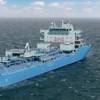Lebanon is planning to establish a floating Liquid Natural Gas (LNG) plant to feed natural gas directly to the country's power stations. Lebanon has been trying to adopt an alternative energy program for years, by diversifying its fuel sources and reducing its dependence on imported oil. With the government shouldering the mounting losses of ElectricitŽ du Liban - which meets Lebanon's annual energy consumption requirements using oil imports - the need to switch to switch to gas has become even more pressing. As part of the new energy strategy, Lebanon plans to build a natural gas pipeline along the coast to feed all its power plants. Up to 2004 the government did a lot of preparatory work to establish an off-shore national gas transmission pipeline from the North to the South. But the efforts were halted for political reasons. For gas supplies to be harnessed, The Natural Gas Master Plan and The Natural Gas Transmission Law, both of which have been sitting in the drawers of the government for years, need to be reactivated. An LNG plant will ensure security of future fuel supplies, which are increasingly vulnerable to instability in oil-producing countries. Imports of natural gas could be purchased from countries such as Egypt, Algeria and Qatar. (Source: International Herald Tribune)
Subscribe for
Maritime Reporter E-News
Maritime Reporter E-News is the maritime industry's largest circulation and most authoritative ENews Service, delivered to your Email five times per week













